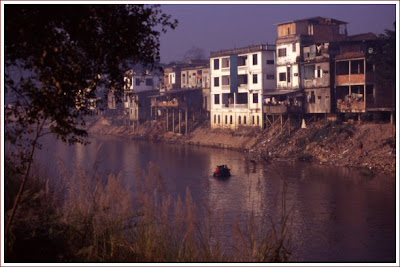The ‘Thai body’ and its Periphery
 Burmese citizens, huddled together on a rubber inner tube, illegally crossing the Moei River that separates Thailand from Burma. Mai Sot, Thailand/Myawadi, Burma - 2005.
Burmese citizens, huddled together on a rubber inner tube, illegally crossing the Moei River that separates Thailand from Burma. Mai Sot, Thailand/Myawadi, Burma - 2005.
At 8 am and 6 pm the national anthem can be heard across Thailand.
In schools children sing it, television and radio stations dutifully broadcast it, loud speakers mounted upon telephone poles in cities and villages cackle with it, and everyone within the state – even at its very edges and whether citizen or not – are expected to stop what they are doing, stand-up, and wait respectfully until the song ends.
The whole country belongs to the Thai people, maintaining thus far for the Thai.
All Thais intend to unite together.
Thais love peace but do not fear to fight.
They will never let anyone threaten their independence.
They will sacrifice every drop of their blood to contribute to the nation.
They will sacrifice every drop of their blood to contribute to the nation.
CHAI YO. [Cheers].
The national anthem, like the border containing the state, is a work of political fiction.
If Thailand was indeed ‘the unity of Thai blood’ with the territorial body of the state then the space created – the political state of Thailand – would be an exclusive space for ethnic Thais.
While circumnavigate the Thai border, the territorial edge of the ‘Thai body’, it is not the lack of actual ethnic Thais that is most striking but the range of ethnic diversity that is most striking.
The periphery of the state is characterized by ethnic diversity that is manifest in contested territory, contested identities, and contested politics.
The circumference of the ‘Thai body’ has very little in common with the narrow nationalist identity espoused by the state.
Yet it is not that the Thai state is particularly at fault.
The ethnic nationalism that causes alienation in peripheral communities is a by-product of the global system of demarcated nation-states.
To understand how embedded the paradigm of the demarcated nation-state is one simply has to think of one global institution – the United Nations. The Thai state is simply exercising spatial governance, with nationalism as a tool of state-craft, in a reflection of the international system of 'nations'.
To have a demonstration of Thai nationalism stressing identity singularity we can again return to the border and the national anthem.
